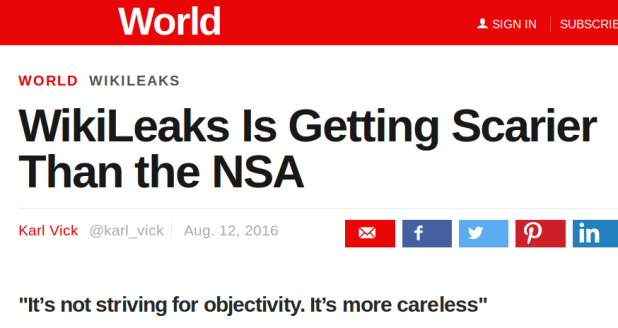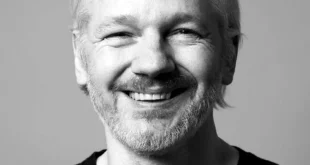Andrew Anglin
Daily Stormer
August 13, 2016
Julian Assange was the hero of the left. Once upon a time, they even ignored his “Swedish rape” (not telling a girl he wasn’t wearing a condom when she for some reason thought he was). They went so far as to make a Hollywood movie about him.
Now he’s worse than the NSA.
Not because he’s exposed Hillary’s corruption. But because he’s exposed corruption in a way that helps Donald Trump.
By the way – just a little prediction here – they’re going to start bringing up this “Swedish rape” again. Guarantee it.
TIME:
When Wikileaks surged to global prominence six years ago, it was for its work posting hundreds of thousands of pages of secret government documents about the U.S. wars in Afghanistan and Iraq, followed by a quarter million confidential cables by American diplomats. Working with major news organizations, including the New York Times, the Guardian and Der Spiegel, the site was associated both with accountability and a bold new version of “radical transparency.”
That has changed. With the publication of e-mails expressly aimed at damaging Hillary Clinton’s presidential candidacy, WikiLeaks has shifted from a global platform for whistleblowers to something less exalted—and lately, a bit strange. Julian Assange, the site’s founder, hinted darkly in a Dutch television interview on Tuesday that a young Democratic National Committee staffer who had been murdered in Washington on July 10 had been killed because he had provided information to WikiLeaks, which posted a $20,000 reward for information on the July 10 death of Seth Rich. “Whistleblowers go to significant efforts to get us material and often very significant risks,” Assange said. “There’s a 27-year-old who works for the DNC who was shot in the back, murdered, just a few weeks ago, for unknown reasons as he was walking down the streets in Washington.”
Assange offered no support for the incendiary suggestion—”We don’t comment on who our sources are,” he coyly replied, when the Dutch interviewer pressed for details on his guest’s insinuation.
…
The episode—coming on the heels of the DNC emails Assange held for release on the eve of the Democratic convention—is seen by critics of WikiLeaks as a sign that once-lauded enterprise no longer qualifies as an independent platform promoting openness. “It’s become something else,” says John Wonderlich, executive director of the Sunlight Foundation, a Washington nonprofit that advocates for transparency. “It’s not striving for objectivity. It’s more careless. When they publish information it appears to be in service of some specific goal, of retribution, at the expense of the individual.”
So he should have held the documents about the DNC collusion with Clinton to Jew-over Bernie because it harmed Hillary, whom he has stated he personally dislikes.
That’s nonsensical.
Obviously, anyone who is anti-tyranny is going to be anti-Hillary, so the very nature of his ideology of government transparency puts him in a place where he is going to dislike Hillary.
Clearly, the information was relevant to America and the people, and his job is to release leaks.
Holding it back would have been non-objective, as it would have served to help Hillary by hiding her criminality.
One measure of the uneasiness that now surrounds WikiLeaks is the difficulty of finding people who will talk about it these days. TIME approached a half dozen groups and prominent individuals who work on the same issues. Only the Sunlight Foundation responded, having earlier posted a detailed critique of the DNC leak, titled On Weaponized Transparency.
This group was founded by two Jews. I don’t know if Wonderlich is a Jew or not.
But Jews want to be involved in everything, so of course they started a government transparency group, and of course they use it to attack
The article emphasized that, by failing to hold back private information like email addresses and credit card information, WikiLeaks poses a similar threat to privacy—if not a greater one—as the government agencies it rails against. “The Center for Responsive Politics was able to report that the DNC asked the White House to reward donors with slots on boards and commissions without exposing unnecessary personal information,” the post noted.
“I’m more afraid of WikiLeaks than I am of the NSA,” says one American privacy advocate, who would speak only without being further identified, partly out of concern about retribution. “When they first burst into our consciousness, they were acting like publishers and journalists. The idea that these rascals were turning the tables on the deep state had great emotional relevance to me. But they turned out not have any principles.”
…
And when Edward Snowden tweeted that Wikileaks’s “hostility to even modest” redaction of documents “is a mistake,” WikiLeaks accused the fugitive of trying to curry favor with the Democrat it has targeted: “Opportunism won’t win you a pardon with Clinton,” the site tweeted in reply.
Snowden has been living in Moscow since 2013, having accepted refuge from President Vladimir Putin—with the help of a WikiLeaks lawyer—after U.S. authorities issued an arrest warrant for his massive disclosure of National Security Agency operations. And Assange is on the run as well—albeit while staying in the same place: Since 2010, the Australian has holed up in Ecuador’s embassy in London, where this week authorities finally made arrangements to set a date for an interview with Swedish authorities investigating a sexual assault allegation that Assange calls punishment for his work.
…
“Snowden is a reformer,” the advocate notes. “Assange really is an anarchist revolutionary who just wants to blow the whole thing up. In his view, whatever comes in its place will be better.”
Obviously, anything would be better.
Like, literally anything imaginable is better than the anarcho-tyranny of the multicultural nanny-state. The only thing that is possibly worse than what we have now is the later stages of this current system, which are rapidly approaching.
 Daily Stormer The Most Censored Publication in History
Daily Stormer The Most Censored Publication in History



